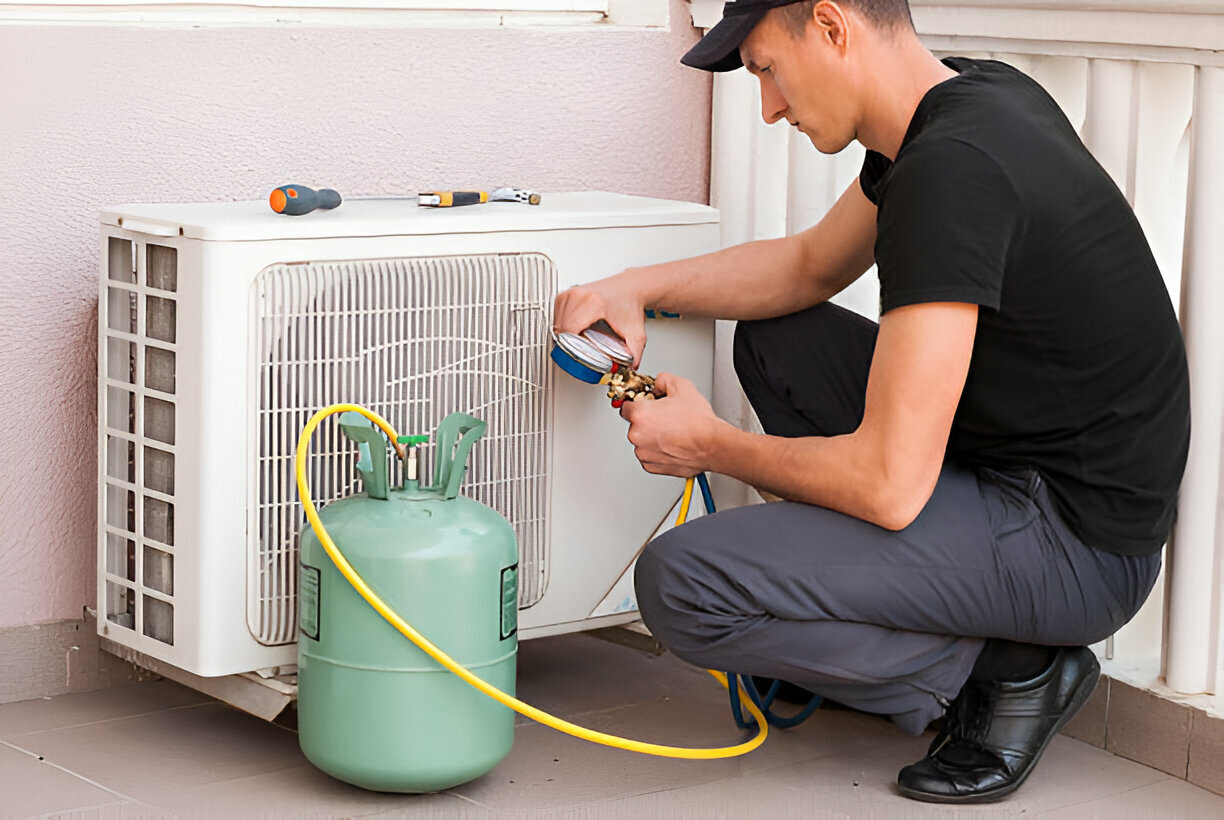Do New Air Conditioners Use Freon, does this thought run in your mind? The simple answer is not at all! Recent regulations and environmental concerns have led to significant changes. New models of mini split air conditioners now use HFCs or other fluids that are less harmful and energy-efficient. Science and technology are working harder to keep our homes comfortable while protecting the Earth.
What Is Freon?
Freon (CCl₂F₂) is a refrigerant used in older air conditioning and freezer systems. It’s a toxic chemical that falls under chlorofluorocarbons (CFCs). Freon was commonly used before 2010, but Congress and the EPA decided to start phasing it out due to its hazardous impact on the ozone layer.
Below are some of the ac refrigerant types:
- R-410A (Puron)
Today, new AC units use R-410A, also known as Puron. The main reason for its invention is to replace Freon. Unlike Freon, R-410A doesn’t contain chlorofluorocarbons.
- R-454b (Puron Advanced)
Another development in refrigerant technology is R-454b, also known as the Puron Advanced version. This is one of the newest refrigerant types, EV, and lighter than R-410A. Thus, R-454b complies with all the standards the EPA and other regulatory bodies set.
Who Invented Freon?

Freon was invented by Thomas Midgley Jr., a chemist who worked for General Motors and DuPont in the 1930s. Its purpose was to provide a safe, non-toxic, and non-flammable refrigerant for use in refrigerators and air conditioning systems.
You may ask, but Freon is also harmful, so why was it invented in the first place?
Before Freon, refrigerants were often dangerous chemicals like ammonia or sulfur dioxide. Freon revolutionized cooling technology, making it safer for residential and commercial use.
Does New AC Still Use Freon?
Thankfully, due to environmental concerns, the EPA began a phase-out process in 1992, targeting HCFC-22 (also known as R-22) and other CFCs. By 2010, manufacturers shifted away from producing Freon home air conditioning systems.
As of January 1, 2020, the production of R-22 was banned in the United States, and if anyone imports it, it will have to face legal consequences. Thus, if you installed a Mini Split AC or HVAC setup after 2014, don’t worry. The newer models use eco-friendly refrigerants.
Can You Replace the AC Refrigerant Yourself?
You can replace the refrigerant in your air conditioner. Yet, it’s not advisable to do so. A person without a technical background may skip some aspects of it which causes leakage issues later on.
How Often Should You Add Freon to an AC Unit?
Adding Freon (or refrigerant) to your AC unit is typically not something that should be done on a regular schedule. Air conditioning systems are sealed and have worked for years without any issues. Unfortunately, if the AC gas leaks or the refrigerant levels go down then you should add more Freon to meet the standard levels.
5 Disadvantages of Freon Gas
1. Environmental Harm
Firstly, Freon is bad for the environment. When it leaks, it goes into the atmosphere and destroys the ozone layer. The ozone layer is like Earth’s sunscreen. Without it, we’re more exposed to harmful UV rays from the sun.
2. Health Risks
You might think, “How does this affect me?” Well, more UV rays can lead to more skin cancers and cataracts. It can also hurt plants and animals, messing up our food chain.
3. Contribution to Global Warming
Further, Freon contributes to global warming. It traps heat in the atmosphere, making the planet hotter. Hotter temperatures can lead to extreme weather. You may notice more frequent heatwaves, stronger storms, and rising sea levels. All of these can significantly disrupt our lives.
4. Disposal Challenges
Another con is that Freon is not easy to get rid of safely. When it’s time to dispose of an old fridge or air conditioner, you need a professional. If not done right, Freon can leak during disposal, harming the environment even more.
5. Rising Costs
Also, Freon is getting expensive. Because of its environmental impact, many countries are phasing it out. This means the cost of Freon is going up. Repairs for older systems using Freon can be costly.
Conclusion
So, what’s the takeaway here? Freon is harmful to both the environment and our health. It’s not a long-term solution for cooling needs. Switching to eco-friendly refrigerants can save money and protect the planet. At Ventiluxes, we utilize the gases that are allowed to comply with the regulations.



Leave a Reply